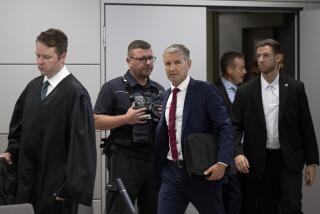Kohl Party Parliamentary Finance Chief Dead
- Share via
BERLIN — The parliamentary finance chief of the party of disgraced former Chancellor Helmut Kohl was found dead in his Berlin apartment Thursday, the victim of an apparent suicide by hanging.
The tragic turn in a drama that already has destroyed Kohl’s reputation and cast doubts on Germany’s democratic credentials was disclosed to Christian Democratic Union legislators during a volatile special session of Parliament to discuss allegations that the party has for years engaged in money laundering and hidden illegal donations.
Wolfgang Huellen’s decision to take his life was influenced by problems “in the personal realm,” a shaken colleague, Joachim Hoerster, told journalists after party members were summoned from the legislative hearing to be told of the death. Debate was suspended for more than an hour to allow the deputies to absorb the news.
Huellen was head of the CDU’s parliamentary finance division, raising widespread speculation that the humiliating crisis at least contributed to his decision, although a suicide note reportedly cited family problems.
Word of Huellen’s death spread shortly after the Bundestag, the lower house of Parliament, opened its first hearings on the allegations that Kohl and other party figures accepted millions of dollars in illegal campaign contributions over the years and hid the money in secret bank accounts.
Kohl’s successor as CDU leader, Wolfgang Schaeuble, made an emotional apology at the start of the session and vowed to make a full disclosure of the party’s funding practices to remove any doubts about the country’s commitment to democracy and the rule of law.
“I would like to apologize for the fact that, quite clearly, laws have been broken and faith in the integrity of our democratic institutions has been damaged during our tenure,” Schaeuble told fellow deputies.
Fiery accusations flared from the ranks of Chancellor Gerhard Schroeder’s Social Democrats before news of Huellen’s suicide staunched the political bloodletting. Social Democratic faction leader Peter Struck appealed to Kohl--who did not attend the session, although he is a Bundestag member--to identify the illegal donors and stop dragging his party deeper into shame and disaster.
“Do your country one last service and cleanse it of the suspicion that shady figures influenced German policy for years,” Struck insisted. He denounced Kohl for putting a misguided sense of personal honor “above the constitution.”
Kohl already has admitted accepting more than $1 million in illegal donations to the CDU during his 16-year tenure as chancellor but has refused to ease the pressure on the party he led for a quarter of a century by disclosing the sources of those secret windfalls. His refusal to name names prompted most party loyalists to turn on him earlier this week, forcing his resignation as the CDU’s honorary chairman.
The consummate politician, who until a few weeks ago seemed to have secured his place in history as the architect of German reunification and the European Union, could soon face jail on contempt charges if he continues to thwart parliamentary and criminal investigations of his actions.
Huellen, a 49-year-old father of two, had been a CDU employee for 28 years and responsible for funding management since 1984--placing him at the helm of the party’s political financing throughout the era now in question.
Before the sobering news of his suicide, German media had ratcheted up the volume and venom of their accusations against Kohl.
“Even Kohl’s closest friends are horrified at how the father of German unity is ruining his great image,” declared the mass-circulation Bild newspaper, which previously had been more respectful than most German newspapers in reporting on the former leader’s role in the crisis. “Doesn’t Helmut Kohl see his stubborn silence on where the money came from is damaging his party and the whole country?”
Other German media have begun referring to the former leader as “Don Kohleone,” a reference to the underworld kingpin of Mario Puzo’s “The Godfather.”
More to Read
Sign up for Essential California
The most important California stories and recommendations in your inbox every morning.
You may occasionally receive promotional content from the Los Angeles Times.














